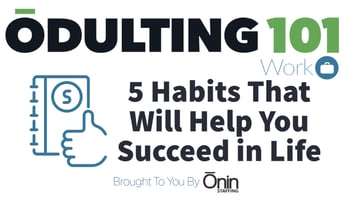So, you have a warehouse supervisor role, or at least you are aiming to become a supervisor one...
Your Mental Health: It’s Okay Not To Be Okay
If you remember back to our S.P.E.M.S. Assessment, your mental health is one of the five key indicators of your overall wellness. Yet, it is often the one category we spend the least amount of time focusing on. It is also one area that has historically had the least social support for, often drawing responses like “get over it” or “suck it up,” even from those who would be the most supportive in seeking treatment from physical ailments.
Mental Health IS a Health Issue
 According to the National Alliance on Mental Illness, 1 in 5 U.S. adults experience mental illness, and mental illness can be related to chronic physical health issues like diabetes, heart disease and other threats. Plus, mental illness has a ripple effect into the individual’s family, community and the world at large. They estimate that Mental Illness costs the global economy around $1 Trillion each year.
According to the National Alliance on Mental Illness, 1 in 5 U.S. adults experience mental illness, and mental illness can be related to chronic physical health issues like diabetes, heart disease and other threats. Plus, mental illness has a ripple effect into the individual’s family, community and the world at large. They estimate that Mental Illness costs the global economy around $1 Trillion each year.
Take a Sick Day
When we have an infection or an injury, we have no problems taking a sick day to allow ourselves time to recover, because we know that putting additional strain on our bodies can do even more damage. Your mind is no different… it IS a part of your body.
If you are experiencing depression or anxiety or other mental issues, “mental health” is just as valid a reason to take a sick day as any other ailment. Adding to mental and emotional stress can do just as much damage as placing physical stress on an injured back or leg.
Mental illness IS an illness. Sick time applies.
Seek Help
More and more, employers are adding specific mental-health related tools to their employee benefits packages. Most healthcare plans cover visits to mental health professionals, and some even offer over-the-phone or in-app services, so you can talk with someone at your convenience, so you don’t even have to miss work.
Even if your employer doesn’t, there are free 24-hour helplines, like the one from NAMI on the infographic in this post. Even if you think no one understands or can help you, you’ll be surprised how much just talking with someone can make a difference.
Practice Self-Care
Take time to take care of yourself. Use vacation time to give yourself a break, if you have it. A change in scenery can help you break out of the routines and habits that might be dragging your down. Practice creativity: journaling or drawing can be a great outlet to help you process your thoughts and feelings. There are plenty of books, like Julia Cameron’s The Artist’s Way, for guided creativity to help through those tough times. Finally, devote time– even if it’s just a few minutes per day– to focus intently on the things that you can be grateful for. Write them down, so you have something you can refer to when things get tough.
Create a Healthier Environment
Invest a little time and effort in creating a place where you can just relax and treat yourself to a little positive reinforcement. Be careful what you’re watching and listening to, especially when you’re down. You might be drawn toward music or videos that match your mood, but that’s a quick road to a downward spiral. Give yourself permission to laugh, or to listen to something uplifting, even when you don’t feel like it.
Talk To Someone
The stigma against talking about mental health is rapidly shrinking. There is no reason to feel like these issues are unimportant or a sign of weakness. More and more it’s being recognized that this is just another form of illness, like strep throat or the flu. Just as no one thinks less of you for taking antibiotics for an infection, there’s no reason not to seek treatment and take care of yourself when mental illness hits.
It’s okay to not be okay. Reach out and talk to someone… it’s the quickest way through to the other side.

